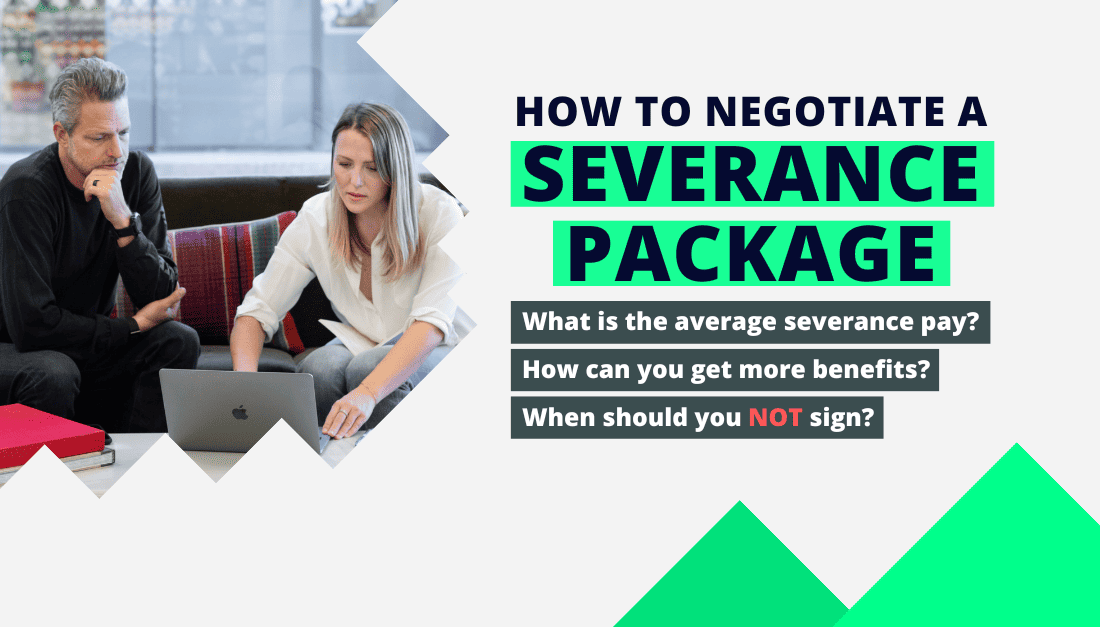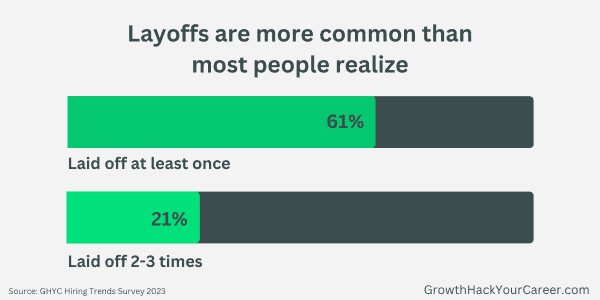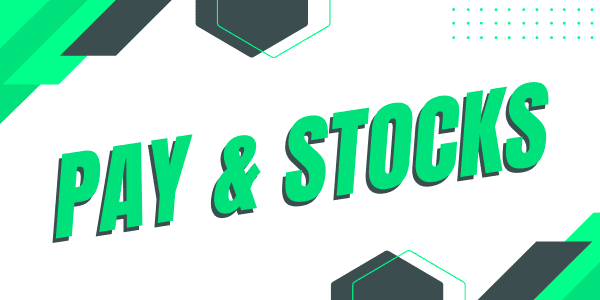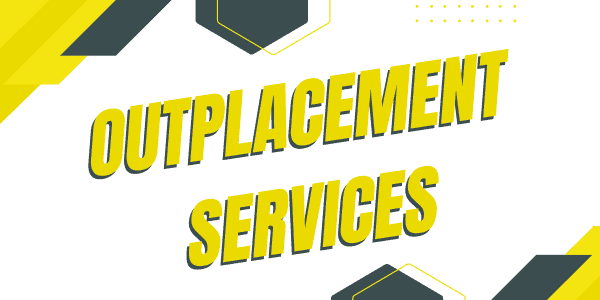
From Layoff to Liftoff: How to Negotiate a Successful Severance Package
While layoffs have certainly been making headlines in the past few years, layoffs are actually a lot more common than most people think.
A recent survey revealed that 61% of people have been laid off at least once in their careers, and 22% of them were laid off multiple times (2-3 times, at least).

If anything this proves that sometimes layoffs can’t be avoided.
That being said, even if layoffs are common, that probably doesn't take away the sting of when it happens to you.
Being laid off is hard.
A layoff comes with sudden uncertainty, unfamiliarity, and what feels like a loss of control. One day you're happily working on projects, and the next day your life changes dramatically.
But the truth is that a layoff doesn't have to be that devastating.
One of the best things you can do when you’re laid off is to negotiate your severance package well.
In this post, I’ll cover everything you need to know about severance packages:
- What is a typical severance package
- When NOT to sign a severance package
- How to negotiate for more benefits
- And how to bounce back quicker
Follow these steps and you’ll set yourself up for a faster recovery and get back on your feet faster than ever.
Let’s jump right in!

What Is the Typical Severance Package for a Layoff?
Let's start by talking about exactly what a severance package is. A severance package is essentially compensation that your employer offers when they terminate your employment.
It typically consists of a lump sum of money and/or other benefits to enable you to get back on your feet.
The most common items in a typical severance package are:
- Pay: A lump sum of money in exchange for agreeing to not sue the company or badmouth them online or in public. This can range from one week's salary all the way up to several months of salary and bonus.
- Extended health benefits: A company can actually continue your health coverage to ensure that you have medical coverage even after you leave the company.
- Job search services: Many employers will also provide job search services, such as resume reviews, interview prep, and career counseling. This is often the most important benefit in a severance package, so if it isn't included, you should definitely negotiate for it.
When Not to Sign a Severance Agreement
Many terminated employees fall into the trap of thinking that something is better than nothing when it comes to severance packages. As a result, they end up signing a severance agreement that doesn't provide as much value as it could.
Don’t worry, this mistake is pretty common, especially if you haven't been laid off before. After all, you don't know what to expect and you don't know what to ask for.
This is why it's SO important to remember that you're not required to sign a severance agreement on the spot.
👉 If your employer gives you an ultimatum - “either sign the package on the spot or lose everything” - don’t do it.
By law, that "pink slip" needs to be accompanied by "reasonable" time (usually 21 days) to consider the offer before signing.
👉 Even if you’ve already accepted your severance package, you still have 7 days to reconsider your decision and back out of it if you change your mind.
Here’s what executive career coach, Sarah Johnston, has to say about severance packages:
"If you are ever presented with a "pink slip," you do not *have* to sign it right away. Your employer may offer you a "release" in exchange for a financial severance package and may pressure you to sign before leaving the room. They are required to give you a "reasonable" amount of time to review the terms before signing. These deadlines are usually irrelevant. The employer WANTS you to sign because it releases them from any legal action you could take."
All that is to say that if you're feeling pressured, don't make any rash decisions.
It's perfectly reasonable to take the time you need to read through the agreement, have it professionally reviewed, and make an informed decision that works for you.
How Much Is the Average Severance Pay?
The next question that often comes up is, "How much is severance pay?”
In general, the average severance pay tends to be 2 weeks of salary for every year you've worked at the company.
For instance, if you've been employed at the company for five years, you should expect 10 weeks of your salary as severance pay.
That being said, it's important to remember that this is just a guideline or baseline. Depending on the company's internal policies, you may be able to negotiate a higher amount.
👉 Your goal should be to get 4 weeks for every year you've worked there.
It all comes down to negotiation and being aware of what you're entitled to based on your specific situation.
Below, I’ll explain how to negotiate a severance package in detail.
How Long Does It Take To Get Severance Pay?
When it comes to the timeline for receiving severance pay, it's important to know that it doesn't happen on the spot. The timeline can vary greatly – ranging from a few days to several weeks, on average.
In some cases, you may receive your severance pay as part of your last paycheck. In other cases, you may have to sign additional paperwork or wait for a predetermined time after termination before receiving it.
The ultimate timeline will depend on the specific circumstances surrounding your termination. However, your employer should outline clear expectations in the severance agreement so that you know when to expect payment.
Make sure you keep a copy of any paperwork or agreements for your records. It's also a good idea to document any conversations with your employer related to severance pay and unemployment and follow up regularly until it's issued in full.

How to Negotiate Severance
With all that said, what if you aren't happy with the amount of severance you’re being offered? In those cases, it's important to remember that you absolutely have the power to negotiate for more.
Here are the steps to take and how to negotiate a better severance package. There are 3 pieces to your severance package negotiation:

1. Pay & Stock
The first step in your severance package negotiation relates to the amount of money and stock you're being offered. Naturally, this is the component that people pay the most attention to.
Pay
As mentioned earlier, your focus with this part of your negotiation should be to try to get 1 month (4 weeks) of salary for every year you’ve worked at the company.
How you negotiate this does take a bit of finesse though.
The best way to negotiate more severance pay is to start by preparing a list of your contributions and accomplishments during your time with the company. This will help you make a case for why the company should be offering you more than what they’re currently proposing.
You want to essentially remind them of the impact you had while working there.
Pro Tip: When you prepare your list, don't move it to the recycle bin after the severance package negotiation. This same information is a great way to start building your resume so you can land your next role faster.
Stock
The other part of your negotiation relates to your stock options. Most companies what’s called a “vesting period,” which is a certain time period before you can get your shares.
If your shares haven’t vested yet, don’t just give up.
In many cases, you can ask for your stock options during your severance negotiation. This works most often when your shares just have a few months left to vest.
It’s important not to overlook this in your severance negotiation because having shares in the company can have huge potential upside someday. Similar to a salary negotiation, you want to give credible reasons about the value you bring and why it makes sense for them to give you your shares.
A severance package is more than just pay
As you negotiate your severance package, it’s important that you approach the conversation with respect and courtesy. You want to keep the relationship amicable, even when advocating for yourself.
Try not to just think about how much money you can squeeze out of the organization. As career coach, Paolo Gallo explains in the Wall Street Journal:
"This can be an opportunity to carve out an agreement that everyone benefits from, and it can be the next step in somebody’s career. Think about what else might be important to you."
While money is certainly an important aspect of negotiating a severance package, take the time to think about other aspects that can make your transition smoother and more successful.
The two most important aspects being benefits and outplacement services…

2. Benefits
The second important piece of your severance package are the benefits.
Many companies may offer to extend your benefits for 1-2 months post-separation through a program called COBRA.
Short for the Consolidated Omnibus Budget Reconciliation Act, this is a law that allows you to continue your health insurance coverage for a limited period after going through specific circumstances, which include involuntary separation from employment.
You should check if your company offers COBRA or extended health insurance coverage during your severance negotiation.
If they don’t offer COBRA, definitely still ask about it. It’s always worth asking if they're willing to extend your benefits, even if just for a little while.
With self-insured healthcare premiums, such as Covered California, costing $250+/month, having some free health insurance coverage during your transition can be a huge relief.
In addition to your health benefits, you should also inquire about any other benefits that may extend into the next stage of your career – such as a 401k plan, vacation pay, tuition assistance, or access to continuing education.
Take a moment to think about what kind of benefits you're likely to need during your transition period and bring these up in the severance package negotiation.

3. Outplacement Services
Perhaps the most overlooked severance benefit may just be the most important. The third thing to negotiate in your severance package is outplacement services.
Outplacement assistance is meant to help laid off employees find a new job faster. Outplacement services include help with writing resumes, preparing for interviews, networking, job searching, and more.
The idea behind outplacement assistance is that your previous company can actually help you find your next job. This means they can pay for you to hire a resume writing service or even just pay for someone to review your resume.
If you're not sure whether your company offers outplacement services, definitely ask about it. They may already have a program in place or they might be willing to pay for such services as part of your severance package.
Remember, your company wants you to still have a good impression of them because their company reputation is immensely important to them being able to hire people in the future.
They know that helping you transition to a new employer goes a long way, so many companies are often willing to pay for outplacement services when asked.
Pro Tip: If your company refuses to offer outplacement services, don't worry. We have some free job search courses that can help you with your job search.
Severance Package Takeaways
There’s really no way around it, getting laid off is awful. When it comes to negotiating your severance package, remember that time is on your side.
Don't rush to make decisions when you're most vulnerable and in shock.
If you’ve lost your job and aren’t sure where to start, I recommend reading our guide on what to do when you’re laid off.
In the guide, I’ve broken down step-by-step what to do during month 1, month 2, and months 3-6.
To get a jump start on your job search, I also recommend taking advantage of the free resources we have at GHYC to get free tools and courses that can help you fast forward your job search.
Just sign up here for free and I’ll send you full access to all of our job search strategies and even a free resume scan.
More from the blog:
Ultimate Career Goals Planner: How to choose your career goals (+7 examples)
Ultimate Career Goals Planner: How to choose your career goals (+7 examples)A mentor of mine once...
Good Weakness for Interview: How to Craft the Perfect Answer (+10 Examples)
Good Weakness for Interview: How to Craft the Perfect Answer (+10 Examples)One of the biggest...
Top 9 Questions for Second Interviews: What to expect & how to answer
Top 9 Questions for Second Interviews: What to expect and how to answer Congratulations! 🎉 If...
Like this? Try our free courses!
Tired of sending your job applications into a black hole and never hearing back? Get hired faster with our guided courses all for FREE!
Bogdan Zlatkov is the Founder of GHYC and author of "The Ultimate Guide to Job Hunting", ranked #1 on Google. He has been featured in the Wall Street Journal, Fast Company, HR Dive, and more. At GHYC, Bogdan creates job search courses & tools by working with award-winning career coaches, best-selling authors, and Forbes-Council members. Prior to GHYC, Bogdan led the content programs at LinkedIn Learning.
